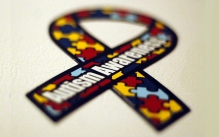Towards autonomy and self-determination for persons with autism

The 2017 World Autism Awareness Day was marked on 2 April across the world with the theme: towards autonomy and self-determination. National and international policy-makers took the time to lend their voices to the need for provision of care and support for persons with autism. The UN Secretary-General António Guterres captured this spirit in his message for the day, when he said: “Let us ensure that we make available the necessary accommodations and support to persons with autism.”
Autistic spectrum disorder (ASD) affects 1 in every 160 children. As at 2013, 21.7million people were estimated to be on the spectrum globally. It is a highly variable neurodevelopmental disorder. While people with autism may be impaired in some regards, particularly social interaction, verbal and non-verbal communication, they could be normal or even superior in others.
Autism and other forms of disability are part of the human experience that contributes to human diversity. Ensuring that the fundamental rights enshrined in the Convention on the Rights of Persons with Disabilities are popularised and defended is central to advancing autonomy and self-determination for persons with autism. Article 3 of the Convention recognizes the right of persons with disabilities to independence of person and to independence of autonomy.
2 April was designated as the annual World Autism Awareness Day (WAAD) by the United Nations resolution 62/139, passed in Council on 1 November 2007. Governments and non-state actors were to create initiatives to raise awareness of autism from the localities to the international sphere, around that day, with effect from 2008.
Raising awareness has been a step in the right direction. Funding for therapy and research have however plunged as a result of budget cuts, across the world, undermining the much desired aim of autonomy and self-determination for persons with autism. This unfortunate trend which commenced in the wake of the Great Recession has worsened in recent times.
Some children with autism in the United States, for example, might not be able to access “applied behaviour analysis” therapy from the beginning of this year, because of cutbacks connected to state funding. The Autism-Europe network has also spoken out against “the effect of austerity on people with autism”.
Evelyne Friedel, Vice-President of Autism-Europe reminds governments that “providing support to people with disabilities is a human right”, adding that “the governments of Europe have confirmed that when they signed the Convention (United Nations Convention on the Rights of Persons with Disabilities, December 2010).”
Concerned by the worrisome effects of austerity measures, the General Secretary of PSI, Rosa Pavanelli points out that:
“People with autism deserve all the accommodation and support we can muster. It is our joy as PSI, that, despite constricting national budgets to promote this, health and social care workers have remained steadfast as awareness on autism increases, in providing psycho-social management, and treatment for persons affected by ASD, as patients and as co-workers.
But they face an uphill task in the face of governments breaking pledges to increase funding that could help expand delivery of services for persons with autism, and rather cutting budgetary provisions for health services. The cost of treating ASD does not justify the deprivation of persons with autism to the human right to health.
People must come before profit. Universal public health care alone can guarantee a better future for us, in all the diversity of our human experience. This is the time for governments to be made to stop cuts in health budgets. The impact of these, including on persons with autism, are quite dire and undermine our collective humanity.”

